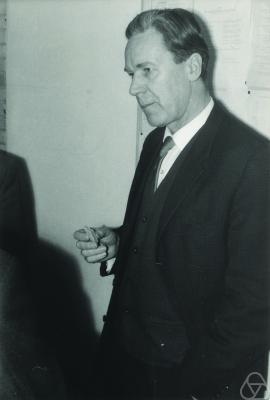- Paul Lorenzen
Infobox Scientist
name=Paul Lorenzen

birth_date =March 24 1915
death_date =October 1 1994
fields =Philosophy ,Mathematics Paul Lorenzen (born
March 24 ,1915 inKiel ,Germany - diedOctober 1 ,1994 inGöttingen ,Germany ) was aphilosopher andmathematician .As a founder of the "Erlangen School" (with
Wilhelm Kamlah ) and the inventor ofgame semantics (withKuno Lorenz ) he was a famous German philosopher of the 20th century.Biography
Lorenzen studied with
David Hilbert as a school boy and he was one of Hasse's students at theUniversity of Göttingen until his promotion in 1938. He became pupil of Krull inUniversity of Bonn . His main work was on the foundations ofmathematics , inproof theory . He created and modified constructive mathematics. Lorenzen taught at Stanford, the University of Texas, and Boston University in the USA.Theory
Lorenzen came in 1962 to
University of Erlangen (South Germany) and founded the school of constructivist philosophy there. He wrote with Kamlah the famous book "Logical Propaedeutic" ("Logische Propädeutik") and worked on game semantics ("Dialogische Logik") with Kuno Lorenz. WithPeter Janich he inventedprotophysics of time and space. He developedconstructivist logic ,constructivist type theory andconstructivist analysis .Lorenzen's work on calculus "Differential and Integral" was dedicated to
Hermann Weyl . Lorenzen used Weyl's technique to develop apredicative analysis, which can reconstructclassical analysis , without theprinciple of excluded middle or theAxiom of Choice .In the theory of geometry and physics, Lorenzen was influenced by
Hugo Dingler . He followed Dingler in building up geometry and physics out of primitive operations. Lorenzen followed Dingler in having doubts aboutgeneral relativity , believing thatMaxwell's equations would need to be modified.Lorenzen was also influenced by
Wilhelm Dilthey 's hermeneutics, and liked to quote Dilthey's saying that knowledge cannot go behind life. Dilthey's "Lebensphilosophie " was the description of the setting in ordinary experience in which we construct the abstractions of mathematics and physics.Lorenzen took modal (incl. normative) logic as a base of technical and political science and research.
Major works
* Paul Lorenzen, "Normative Logic and Ethics", Mannheim/Zürich 1969.
* Paul Lorenzen, "Lehrbuch der konstruktiven Wissenschaftstheorie".
* Paul Lorenzen, "Differential and integral;: A constructive introduction to classical analysis".
* Paul Lorenzen, Karl Richard Pavlovic (Translator), "Constructive Philosophy". The University of Massachusetts Press, Amherst 1987.- "deductive presentation of constructivist philosophy, mathematics and protophysics".
* Paul Lorenzen, "Formal Logic" (Synthese Library (Hardcover)) (Hardcover - July 1964).
* Wilhelm Kamlah, "Paul Lorenzen: Logical Propaedeutic: Pre-School of Reasonable Discourse".---
* Diane Loring Souvaine, "Paul Lorenzen and constructive mathematics".ee also
External links
* [http://www.genealogy.ams.org/html/id.phtml?id=49135 just some basic info]
* [http://dispatch.opac.ddb.de/DB=4.1/REL?PPN=11857437X books from and about Lorenzen at ddb in germany]
Wikimedia Foundation. 2010.
